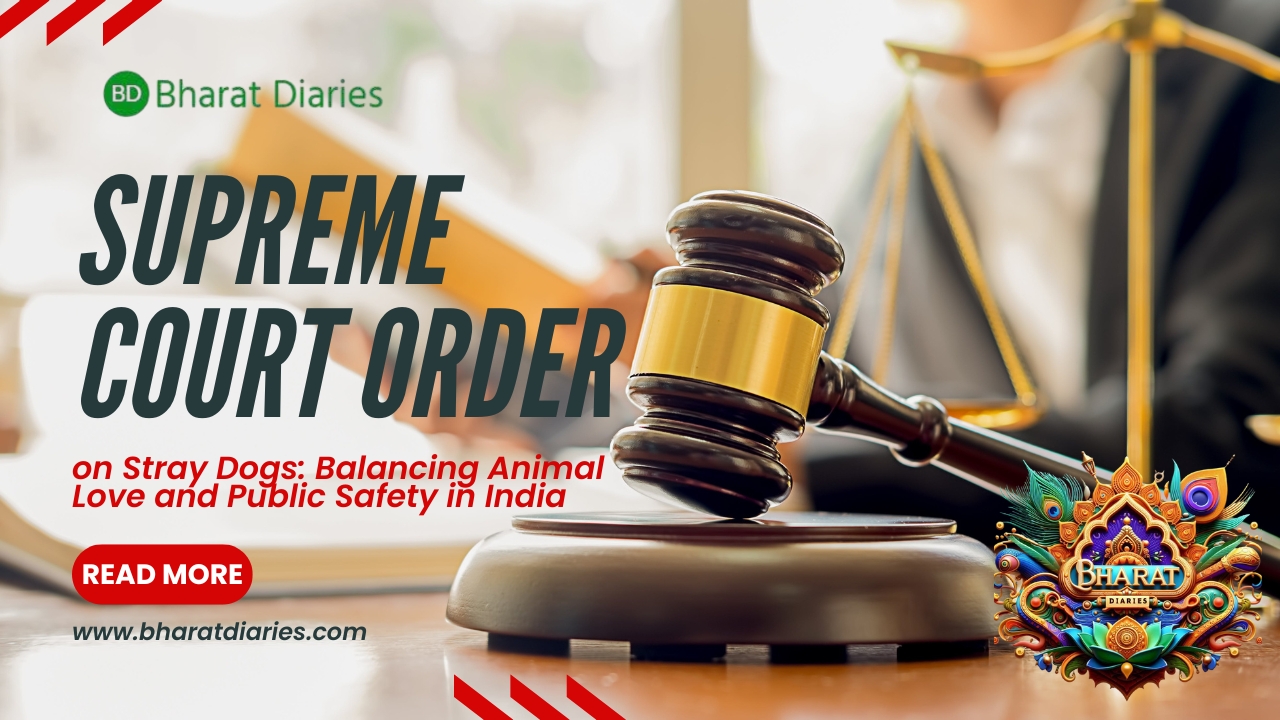
Supreme Court’s order on stray dogs sparks debate in India. Can love for animals coexist with public safety? Let’s explore the real issues and solutions.
Table of Contents
Stray dogs have become one of the biggest public safety concerns in India today. From metro cities like Delhi to small towns and villages, dog bite incidents are rising at an alarming rate. Recently, the Supreme Court passed an order for stray dogs in Delhi-specific cases, but many believe this issue requires nationwide attention.
While it’s heartwarming to see people showing compassion toward animals, we cannot ignore the tragic reality—children, elderly people, and ordinary citizens are getting seriously injured, and in some cases, even losing their lives to stray dog attacks. Unfortunately, when such incidents occur, very few animal lovers come forward to take responsibility or provide help.
This blog will explore:
- The current Supreme Court order and its implications.
- The public safety crisis caused by stray dogs.
- The responsibility of dog lovers in addressing the problem.
- The double standards in our society regarding compassion.
- Practical solutions for a balanced approach between animal welfare and human safety.
1. Understanding the Supreme Court’s Order on Stray Dogs
The Supreme Court of India recently addressed specific cases concerning stray dogs in Delhi. While the decision was intended to protect both animals and humans, it has reignited a nationwide debate—should such regulations be implemented across all of India?
Key Highlights of the SC Order:
- Guidelines on how stray dogs should be fed and cared for without posing a threat to public safety.
- Directions to municipal bodies to ensure sterilization and vaccination drives are conducted regularly.
- Protection clauses for animal feeders but also accountability to avoid endangering neighbors.
However, the big question remains: Why only Delhi? Dog bite cases are not confined to the capital; they occur in Kerala, Bihar, Maharashtra, Uttar Pradesh, and even rural areas where healthcare facilities are limited. A nationwide directive could ensure a uniform policy to tackle this growing crisis.
https://bharatdiaries.com/why-big-boss-19-is-harmful-for-indian-youth/
2. The Reality of the Stray Dog Problem in India
India has an estimated 1.5–2 crore stray dogs roaming on streets. While some are harmless, others can become aggressive due to hunger, disease, or territorial instincts.
Dog Bite Statistics:
- In 2022 alone, more than 1.7 crore dog bite cases were reported across India.
- Several fatalities, especially among children and elderly people, have been recorded.
- Rabies—caused by dog bites—still claims around 20,000 lives every year in India.
Real-Life Scenario:
In many neighborhoods, school-going children walk in fear, holding sticks or stones to protect themselves. Elderly people avoid morning walks. In rural areas, a single dog bite can mean hours of travel to the nearest hospital for treatment.
3. Compassion vs. Responsibility – The Dog Lover’s Dilemma
It’s heartening that many Indians feel compassion toward stray animals. Feeding a hungry dog or protecting it from harm is admirable. But compassion without responsibility can backfire.
Here’s the truth—
When a stray dog attacks, no dog lover steps forward to adopt that dog or pay for the victim’s treatment. Feeding them on streets without ensuring sterilization or training makes them more territorial, sometimes increasing aggression.
A thought to ponder:
If you love dogs, why not adopt them and give them a safe home? Leaving them on the streets but feeding them occasionally is like giving partial care without addressing the real issue.
4. The Bitter Truth About Selective Compassion
There’s a deeper social hypocrisy here. Many people campaign for stray dogs but ignore human suffering around them.
For example:
- There are thousands of old-age homes in India where elderly parents are abandoned by their children.
- Many of these so-called “animal lovers” may themselves have neglected their own parents, yet they show intense affection toward animals.
- If someone can’t take care of their own blood relatives, can their love for animals truly be considered genuine? Or is it just for social media validation?
This is not to say one should not love animals—but compassion should be balanced and consistent.
5. Public Safety Must Come First
India’s Constitution allows citizens to protect animals, but it also ensures the right to life and safety for human beings.
Why public safety should be the priority:
- Stray dogs can attack in packs, making it impossible for an individual to defend themselves.
- Infections from dog bites, including rabies, can be fatal if not treated quickly.
- In crowded public places, aggressive dogs can cause panic, leading to accidents.
Case Study:
In Hyderabad, a 4-year-old boy was mauled to death by a pack of stray dogs while playing near his home. Despite public outrage, no one took responsibility for those animals afterward.
6. The Role of Municipal Authorities
Local municipal corporations have a legal responsibility to control the stray dog population through Animal Birth Control (ABC) programs and vaccination drives.
Challenges they face:
- Lack of funding and manpower.
- Resistance from animal rights activists when dogs are relocated.
- Poor coordination between NGOs and civic bodies.
What can be done:
- Increase sterilization rates to at least 80% in urban areas within two years.
- Build public animal shelters where dogs can be housed instead of roaming freely.
- Strictly penalize those who abandon pet dogs on streets.
7. What Dog Lovers Can Do to Help
Instead of just feeding strays, dog lovers can:
- Adopt or foster stray dogs to remove them from dangerous street environments.
- Fund sterilization and vaccination programs in their localities.
- Create awareness campaigns in schools and residential societies about responsible feeding and care.
- Partner with NGOs to build shelters or rescue centers.
A real animal lover should aim for long-term safety and welfare, not temporary gestures.
8. Balanced Solutions – Coexisting with Stray Dogs Safely
A complete removal of stray dogs from streets is neither possible nor ethical. But coexistence with safety is achievable.
Practical Solutions:
- Nationwide Supreme Court Guidelines – Uniform laws for all states.
- Mandatory Registration of Animal Feeders – So that they take responsibility for the dogs they feed.
- Awareness & Education – Teach people how to behave around dogs to prevent aggression.
- Medical Infrastructure – Ensure every district has rabies treatment facilities.
- Public-Private Partnerships – Engage NGOs, local businesses, and citizens to create sustainable dog care programs.
9. Moral Responsibility – Humans First, Then Animals
It’s time for society to remember that human life should always come first. Love for animals is beautiful, but it must not come at the cost of human safety.
Helping a stray dog is admirable, but if the same person ignores the needs of their elderly parents or turns a blind eye to human suffering, their compassion loses moral strength. True humanity means caring for all vulnerable beings—human or animal—equally.
Conclusion
The Supreme Court’s order on stray dogs is a step forward, but the problem is much bigger than Delhi. It demands nationwide regulations that protect both animals and humans.
We, as a society, need to strike a balance between compassion and responsibility. Love for animals should be matched with accountability, and public safety should never be compromised.
So the next time you see a stray dog, ask yourself—am I ready to take full responsibility for its life and actions? If not, maybe it’s time to support systematic solutions instead of temporary sympathy.
